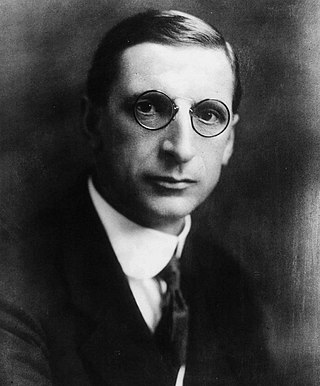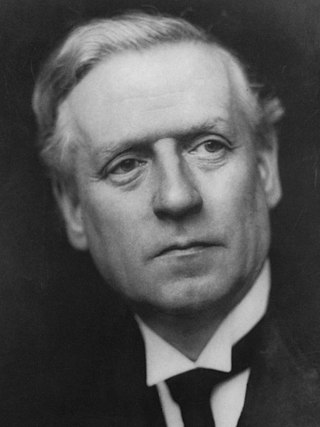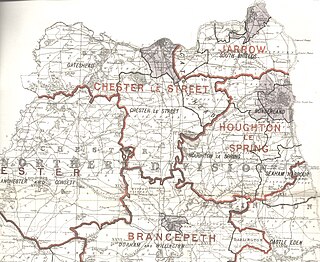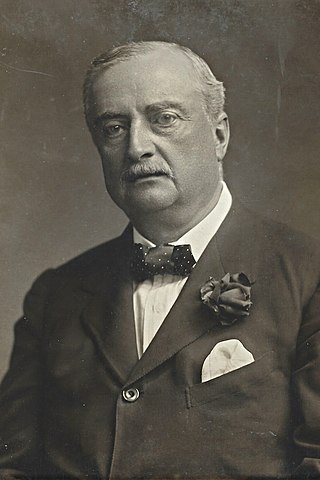Related Research Articles

The Ulster Unionist Party (UUP) is a unionist political party in Northern Ireland. The party was founded as the Ulster Unionist Council in 1905, emerging from the Irish Unionist Alliance in Ulster. Under Edward Carson, it led unionist opposition to the Irish Home Rule movement. Following the partition of Ireland, it was the governing party of Northern Ireland between 1921 and 1972. It was supported by most unionist voters throughout the conflict known as the Troubles, during which time it was often referred to as the Official Unionist Party (OUP).
The Liberal Unionist Party was a British political party that was formed in 1886 by a faction that broke away from the Liberal Party. Led by Lord Hartington and Joseph Chamberlain, the party established a political alliance with the Conservative Party in opposition to Irish Home Rule. The two parties formed the ten-year-long coalition Unionist Government 1895–1905 but kept separate political funds and their own party organisations until a complete merger between the Liberal Unionist and the Conservative parties was agreed to in May 1912.

The Irish component of the 1918 United Kingdom general election took place on 14 December 1918. It was the final United Kingdom general election to be held throughout Ireland, as the next election would happen following Irish independence. It is a key moment in modern Irish history, seeing the overwhelming defeat of the moderate nationalist Irish Parliamentary Party (IPP), which had dominated the Irish political landscape since the 1880s, and a landslide victory for the radical Sinn Féin party. Sinn Féin had never previously stood in a general election, but had won six seats in by-elections in 1917–1918. The party had vowed in its manifesto to establish an independent Irish Republic. In Ulster, however, the Unionist Party was the most successful party.

The December 1910 United Kingdom general election was held from 3 to 19 December. It was the last general election to be held over several days and the last to be held before the First World War.

The January 1910 United Kingdom general election was held from 15 January to 10 February 1910. The government called the election in the midst of a constitutional crisis caused by the rejection of the People's Budget by the Conservative-dominated House of Lords, in order to get a mandate to pass the budget.

The 1892 United Kingdom general election was held from 4 to 26 July 1892. It saw the Conservatives, led by Lord Salisbury again win the greatest number of seats, but no longer a majority as William Ewart Gladstone's Liberals won 80 more seats than in the 1886 general election. The Liberal Unionists who had previously supported the Conservative government saw their vote and seat numbers go down.

North Antrim is a parliamentary constituency in the United Kingdom House of Commons. The current MP is Jim Allister (TUV).

The Irish Unionist Alliance (IUA), also known as the Irish Unionist Party, Irish Unionists or simply the Unionists, was a unionist political party founded in Ireland in 1891 from a merger of the Irish Conservative Party and the Irish Loyal and Patriotic Union (ILPU) to oppose plans for home rule for Ireland within the United Kingdom of Great Britain and Ireland. The party was led for much of its existence by Colonel Edward James Saunderson and later by St John Brodrick, 1st Earl of Midleton. In total, eighty-six members of the House of Lords affiliated themselves with the Irish Unionist Alliance, although its broader membership among Irish voters outside Ulster was relatively small.
South Dublin, a division of County Dublin, was a county constituency in Ireland from 1885 to 1922. It elected one Member of Parliament (MP) to the House of Commons of the Parliament of the United Kingdom, using the first past the post voting system.
Independent Unionist has been a label sometimes used by candidates in elections in the United Kingdom, indicating a support for British unionism.
Patrick Joseph Brady was an Irish nationalist MP for Dublin St Stephen's Green constituency from 1910 to 1918, during the closing years of the Irish Parliamentary Party's dominance of Irish politics. Later, he was a Senator of the Irish Free State from 1927 to 1928. He was one of the few parliamentarians who served in both the House of Commons and in the Oireachtas.

Sir Thomas Wallace Russell, 1st Baronet, was an Irish politician and agrarian agitator. Born at Cupar, Fife, Scotland, he moved to County Tyrone at the age of eighteen. He was secretary and parliamentary agent of the Irish temperance movement and became well known as an anti-alcohol campaigner and proprietor of a Temperance Hotel in Dublin.
The 1913 Altrincham by-election was a Parliamentary by-election held on 28 May 1913. The constituency returned one Member of Parliament (MP) to the House of Commons of the United Kingdom, elected by the first past the post voting system.
The Manchester South by-election was a Parliamentary by-election held on 5 March 1912. The constituency returned one Member of Parliament (MP) to the House of Commons of the United Kingdom, elected by the first past the post voting system.

The 1914 North West Durham by-election was a Parliamentary by-election held on 30 January 1914. It returned one Member of Parliament (MP) to the House of Commons of the United Kingdom, elected by the first past the post voting system.
The 1913 Wick Burghs by-election was a Parliamentary by-election held on 8 December 1913. It was a Scottish Highland constituency that returned one Member of Parliament (MP) to the House of Commons of the United Kingdom, elected by the first past the post voting system. The constituency was a district of burghs representing the parliamentary burghs of Cromarty, Dingwall, Dornoch, Kirkwall, Tain and Wick. The by-election took place during the third anniversary of the Liberal Government's re-election of December 1910. It was thought to be a key indicator to the outcome of the following general election anticipated to take place in 1914–15.
The 1914 Londonderry City by-election was a Parliamentary by-election held on 30 November 1914. The constituency returned one Member of Parliament (MP) to the House of Commons of the United Kingdom, elected by the first past the post voting system.

The Irish component of the December 1910 United Kingdom general election took place between 3 and 19 December, concurrently with the polls in Great Britain. Though the national result was a deadlock between the Conservatives and the Liberals, the result in Ireland was, as was the trend by now, a large victory for the Irish Parliamentary Party. The IPP supported the Liberals to form a government after the election. This was to be the party's last victory, however. Due to the outbreak of World War I in 1914, the next general election would not be held until 1918, by which time events both in Ireland and Britain and outside would conspire to see the rise of a new nationalist party, Sinn Féin, and the subsequent demise of the IPP.
The 1916 North Louth by-election was held on 24 February 1916. The by-election was held due to the death of the incumbent Irish Parliamentary MP, Augustine Roche. It was won by the Irish Parliamentary candidate Patrick Whitty.
The 1911 North Tyrone by-election was a Parliamentary by-election. North Tyrone returned one Member of Parliament (MP) to the House of Commons of the United Kingdom, elected by the first past the post voting system. The by-election was held on 6 October 1911.
References
- ↑ "Leigh Rayment - Commons". leighrayment.com. Archived from the original on 7 June 2008.
- ↑ Walker, B.M., ed. (1978). Parliamentary Election Results in Ireland, 1801-1922. Dublin: Royal Irish Academy. ISBN 0901714127.